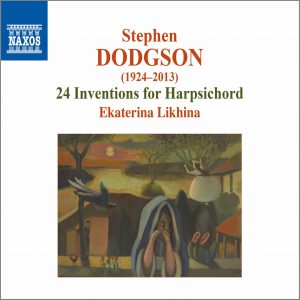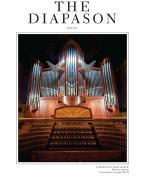A winning transatlantic review from Larry Palmer and The Diapason magazine:
 For the gift list (including self)
For the gift list (including self)
The late British composer Stephen Dodgson (1924–2013) was particularly celebrated for his idiomatic writing utilizing plucked instruments, especially guitar and harpsichord (and, in one unique example, Duo alla fantasia for Harp and Harpsichord, composed in 1981 for harpist David Williams and me). That Stephen should write idiomatically for our keyboard instrument is scarcely surprising since his wife is the harpsichordist Jane Clark.
It is a particular pleasure to recommend the first complete recording of the first four books of Stephen Dodgson’s Inventions for Harpsichord, each set comprising six individual pieces, for a total of 24. A fifth book, also comprising six Inventions, is not included in this release, just issued by Naxos (9.70262) as the debut release of the young Russian harpsichordist Ekaterina Likhina. Recording sessions took place in September 2016 at the Musikhochschule in Würzburg, Germany, where Ms. Likhina has been studying with Professor Glen Wilson (who served as producer for the project).
 Playing throughout the 1:11:37 duration is first-rate as each set of six displays its various moods. None of these individual movements exceeds four minutes, 58 seconds, with the majority of them timed between two and three minutes. The harpsichord, a resonant French double built in 2000 by Detmar Hungerberg of Hückeswagen, Germany, is based on a 1706 instrument by Donzelague of Lyon, France. (This information is not included in the material accompanying the recording; it had been submitted but there was insufficient space to include it, one of the few drawbacks of the compact disc format. I am grateful to Jane Clark and Glen Wilson for providing this addendum). Both of these gracious colleagues also contributed the recording’s illuminating program notes brimming with unique information: Jane Clark shares her special perspective on the development of her husband’s affinity for the instrument, while Glen Wilson shares his rationale for the recording’s pitch level (A=415) and temperament (based on Neidhardt 1724), a well-tempered tuning that “reflects Dodgson’s instinctive sense of C major as the center of a natural tonal universe.”
Playing throughout the 1:11:37 duration is first-rate as each set of six displays its various moods. None of these individual movements exceeds four minutes, 58 seconds, with the majority of them timed between two and three minutes. The harpsichord, a resonant French double built in 2000 by Detmar Hungerberg of Hückeswagen, Germany, is based on a 1706 instrument by Donzelague of Lyon, France. (This information is not included in the material accompanying the recording; it had been submitted but there was insufficient space to include it, one of the few drawbacks of the compact disc format. I am grateful to Jane Clark and Glen Wilson for providing this addendum). Both of these gracious colleagues also contributed the recording’s illuminating program notes brimming with unique information: Jane Clark shares her special perspective on the development of her husband’s affinity for the instrument, while Glen Wilson shares his rationale for the recording’s pitch level (A=415) and temperament (based on Neidhardt 1724), a well-tempered tuning that “reflects Dodgson’s instinctive sense of C major as the center of a natural tonal universe.”
You might wish to order multiple copies of this recording for distribution to friends who “already have everything.”
Larry Palmer, The Diapason
https://www.thediapason.com/








